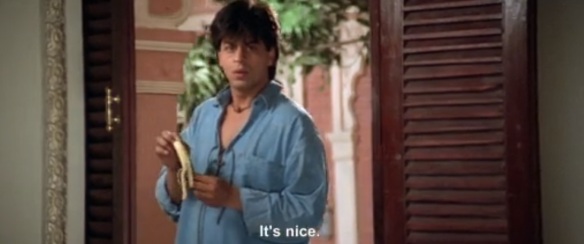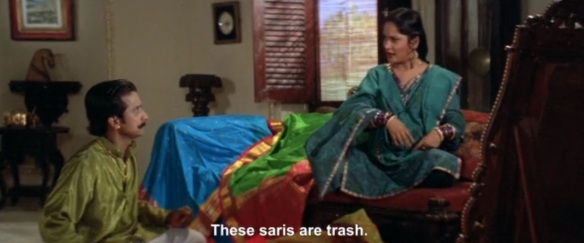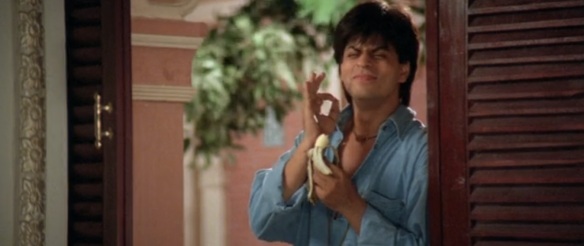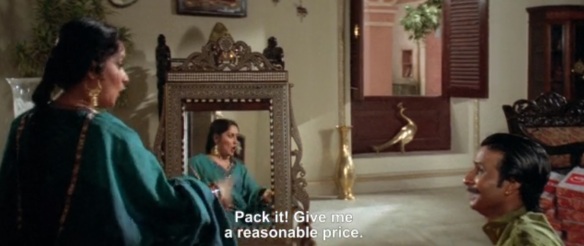Happy Wednesday! It is Shahrukh month, and I am still doing the DDLJ posts in addition to the 31 days o’ SRK posts. Mostly because there are a lot of people who read the DDLJ posts for the pure boring analysis, not the SRK love, so it’s kind of counter-programming. (full index of DDLJ coverage here)
I never really noticed this scene much on my watches of this movie, but doing a close study of the film, OH MY GOSH is it interesting!!!!!! Especially in context of the whole sequence.
This is one long day in the life of Shahrukh, that started with waking up early to feed pigeons with Amrish Puri, followed by lying to Kuljit in order to get out of going hunting, then sneaking into the kitchen as we saw in the last section, and now this part with Himani Shivpuri buying saris. Followed by Achala Sachdev teaching and singing to the children. And culminating in his grabbing Kajol and almost getting a kiss from her.
Now, stick with me here, but what we are seeing is mother-maiden-crone, followed by his reward (a woman of his own). The Mother-Maiden-Crone dynamic is a standard one in all cultures, essentially based on women’s reproductive organs. Maiden would be someone who has not yet had sex/started menstruating. Mother is a mother, sometimes just meaning a mature woman, sometimes represented as a pregnant figure. And Crone is someone post-menopause.
Farida in the kitchen, she was the mother. Wise, loving, charming, but also running the household, advising, someone he should look up to. And someone who, in the end, he related to primarily as the mother of his lover/his future mother-in-law.

And then we have the maiden. The silly flirty Himani Shivpuri who is still thinking of clothes to attract a man, not food to care for the man she has and her children with him. Who is somewhat set aside from the other women, not in the kitchen with the two mothers and their daughters, but by herself as the woman who has not yet found her permanent place.

And finally we have the crone. Achala Sachdev, who no longer has to do the work of the kitchen, but is not by herself preparing for womanhood either. She is in the world, more so than the other two options, interacting with the children. And Shahrukh makes a point to interact with her as well.

And it is only after he has paid his worship to mother-maiden-crone that he gets his reward, Kajol. Notice that Kajol and Mandira Bedi are none of these three, not yet. They are not the “maiden” who picks her own clothes and tries to please a man. They are not restricted to the kitchen with the “mothers”, both of them eventually make their way outside to join in the singing. And they need not settle there either, they do not have to learn wisdom at the foot of the “crone” if they choose, they can walk off and find something else for themselves. As young women on the brink of exiting childhood and entering marriage, they have a peculiar kind of freedom.
And how does Shahrukh interact with these three types, mother-maiden-crone? Well, the first and last are the easiest. We saw the “mother” already, he plays the adorable little boy with her. And with the crone, simple respect and obedience are all that is required. But with the “maiden”, there is something else needed. An indication that she is a beautiful woman, without indicating that he is attracted to her. An equality indicating that she is not above him in the way “mother” or “crone” would be, while still not crossing the lines and treating her as he would a friend.
And here is where we get the “our man on the inside” idea. I mentioned in the last section how Shahrukh goes through multiple identities in that kitchen scene. He sneaks his way in by pretending to be the kind of man who would be welcome in a kitchen, a delivery man. Once he is inside, he exerts his authority as an upperclass male to stay there, taking the carrot tray away from Farida and insisting on helping. But he is using all that authority in order to do womanly things in a womanly space. Still behaving as a man, but in a woman’s realm.
This is slightly different. He is carefully staying outside of a woman’s realm in this case, because to enter Himani’s chambers in this case would either be an intrusion (a kitchen is one thing, a bed chamber is another), or would lower his status. We are introduced to this sequence through an unheard voice, a man’s voice, encouraging Himani to buy the sari. This man speaks through out, while Shahrukh is silent. But Shahrukh’s silence is his power.

The poor sari salesman, he has to huddle on the floor, obey Himani’s orders, constantly speak in subservient tones to her. It is the only way he can be allowed into this female space, if he lowers himself to that degree.

In contrast, Shahrukh is carefully outside of this space, even his voice does not enter it. He is there to relate to Himani, to help her, but he is not going to lower himself to the servant level by entering the room. Or to the attacker/aggressor level by forcefully entering the room.

And so instead he serves as the face outside the frame, another version of Himani’s mirror. And a familiar version of the man outside of the purdah frame. Just like a young woman might have been kept behind a veiled carriage, or artistically carved wooden screens, only able to interact with a man through eyes, so are Himani and Shahrukh here. In a fun funny way, but the sense of boundary is still there.

Again, I never noticed this before, but this sequence is perhaps the most difficult in the entire film in terms of filming. We are dealing in 3 planes of space. The foreground, with Himani and the salesman. The middle ground, with the mirrored reflection, and the background with Shahrukh through the window.

But it’s more than that. First, notice how the golden rectangle appears over the over again in this scene. The mirror and the window frame are both that ideal the long side is twice as long as the short dimension. As is the half-shutter. And Shahrukh himself takes up one third of the frame, creating another vertical rectangle marking his third, and a horizontal one marking the space where he is not.
It’s a static shot, but Adi creates interest by using the saris. As Himani’s reflection changes, red to green to pink, the same frame is repeated again and again, but slightly different feeling every time. There is one other marker of time passing, but I will get to that at the end.

Shahrukh has taken control of this interaction immediately. He is not the lowly peon inside the room, he represents male authority outside, the very people Himani is trying to please. Moreover, he is offering the perspective of that male authority freely, something Himani can trust because she knows he needs nothing from her, as a free upperclass male he has more power than she does and no reason to lie (unlike the salesman in the room). And so she ignores both the salesman (less than her) and the mirror (her own opinion) and sends her eyes past both of them to Shahrukh (greater than her).

Shahrukh’s reaction shot’s in this scene are lovely, because they are purely judgement based. He doesn’t give her “ooo, you are disgusting” or “oooo, you are beautiful!” kind of reactions, simply “yes, no, maybe” reactions. He is considering the evidence and making a conclusion, not just reacting from his gut. Again, it helps with making this into an appropriate interaction, between a man and a woman but not a man who is attracted to a woman.

And Himani benefits from this! At least as I see this scene, Shahrukh is giving sincere advice, not just playing her. And she is able to use this advice to help her with the man who is trying to play her, the sari salesman that sees her just as a source of a sale. He may be less than her in most ways, but that does not mean she is safe with him. He won’t attack her physically or anything, but he will lie to her and try to pressure her into spending money she does not want to spend. And that is what Shahrukh is protecting her from, buyers remorse, by giving her the alternative perspective she needs.

He is amused watching this interaction, but I think amused at watching Himani win out over the salesman, not at Himani herself. He isn’t trying to play a trick on her, he is trying to work with her to defeat the salesman. Because he is “Krishna”, he likes playing tricks, especially tricks with women.

That Krishna thing, that’s a real thing. The trickster child/man. Baby Krishna is adorable and childlike, but also flirtatious and enjoys pretty women. That’s what Shahrukh is playing here, still a child, non-threatening in a way, but also with a man’s judgement. There’s a certain enjoyment for him in playing this trick with a pretty woman as his partner, you can see it in his face, an extra enjoyment without the bitterness at the center of when he has to trick Kuljit and spend time with someone who disgusts him.

Which is extra good since, of course, Himani is going to be his stepmother! That storyline isn’t fully explored in this film, but it is clearly set-up that Anupam likes her at first sight and vice versa. And this scene here, before Anupam has even arrived, sets up Shahrukh and Himani as having a friendly happy relationship that will be a good basis for a stepson-stepmother dynamic.

Again, Shahrukh’s expression is perfect. He isn’t giving a “wowsa! Hot stuff!” face. Just a judgement of “just right!” with an extra smile of pleasure. The kind of squinched face smile that a small child would have. He is a little boy who likes seeing his mother look pretty, but not a man who is attracted to her. Although also not a little girl who has no idea what men would like.

And Himani is able to play the game with him. She is keeping his opinions and interactions secret from the salesman, letting on as though she is only mildly interested in the perfect sari. Oh, and it is the perfect sari! At least, I think so, noticeably prettier than the others she has tried. Shahrukh is giving her good advice.

And now the banana! Shahrukh first appears in the doorway holding a banana, a very phallic symbol. Through out this scene, he peels it and slowly eats it. He is either rejecting his masculinity through destroying that symbol, or taking it inside of himself because he is so masculine that he can destroy it. But the end result is an empty banana peel, which has the opposite kind of appearance than a phallic symbol. Which he holds for a moment, before throwing away.
The banana has a simpler meaning as well, the casual boyish effect of snacking between meals while walking around the house, informal and free. That alone would be worth it. But the phallic imagery also cannot be escaped.

And one final shot of that perfectly framed room. Once Shahrukh leaves, the room loses energy. The empty space to the right is glaring. We can feel the same loss that Himani does, not having his presence.

And then the loss again, as she looks in the mirror, the only reflection of herself now available to her, once again isolated from the rest of the world, and next to it there is the empty “mirror” where Shahrukh once was, to give her a more honest reflection.


Pingback: Dilwale Dulhania Le Jayenge: Scene By Scene Analysis in Exhaustive Detail Index | dontcallitbollywood
Great insight. This is one of my favorite little scenes; I always felt that Himani felt undervalued in the household, and this attention is so welcome. (By the way, you shift actors’s names early on. I feel bad even pointing it out.)
LikeLiked by 1 person
Don’t feel bad! I should really update the “House Style” section on grammar and spelling to say that I appreciate it when my readers generously help me out with these things.
I also always felt like Himani was a little bit left behind in the household. Not quite ready to give up and move back to the kitchen or on to “crone” status, but doesn’t really fit in with the young women either. And just generally doesn’t fit in, too loud and bright and all of that. I love thinking of her finding a new household with a stepson who “gets” her. And I also like picturing Kajol having her cool aunt around to have fun with in the house.
On Wed, Oct 4, 2017 at 3:16 PM, dontcallitbollywood wrote:
>
LikeLiked by 1 person
And there is the germ of an age-appropriate fan fic for SRK, with suitable shifts in casting, of course.
LikeLike
I was really waiting to see how you interpret the banana, but feel a little let down at your almost cursory treatment of it. In view of all your racy fan fic and photo posts, can we not go a little more deeply (ahem!) into that phallic symbolism? I was always bothered by the banana eating during this scene, because, on the surface, it just looks like SRK being rude (one doesn’t normally eat while having a conversation, even a mute one, especially with someone older). But, as a viewer, I always had the nagging feeling that the action is there for a reason, just on the edge of my consciousness. Now with your analysis here, I suggest that we can look at it another way, as rating the sexual attraction of the different saris Himani is considering. Thus, the first few don’t quite measure up, and so SRK is still peeling the banana. It is still the foreplay stage that may or may not lead to anything further. As she gets to more “maybe” type of saris, he starts to eat the banana. So, the sari could lead to something, but nothing spectacular in the way of love. When the “perfect” sari is found, he gobbles up the banana — the climax! And having achieved this, he leaves (as men are accused of doing too frequently), throws the now useless banana peel away (ooh, can we conflate that with a used condom as a symbol? Or is that too much of a stretch?).
LikeLike
The ‘banana’ always reminds me what ShahRukh says to the audience people he receives on stage: Hold the micro like a banana. (regardless the gender…) Is he naughty? Oh yes, he is 😀 (I think, in every culture, the banana has the same symolic meaning…or am I wrong?)
LikeLiked by 1 person
Yes, I was at the first “Temptations” (I think) tour by SRK, and I really cracked up when he said it, because I remembered this scene (he actually said it several times, to different people, and it amused me each time — especially because he kept saying, “Hold it close to your mouth, like a banana”).
LikeLiked by 1 person
Sorry, I meant, he would say, “Hold it close to your mouth, like you’re going to eat a banana.”
LikeLiked by 1 person
As many times as I’ve watched this film how did I manage to completely miss the banana symbolism????
LikeLike
I will never like this movie, nor Shah Rukh’s character in it, but this is one of his more like-able scenes. In reality he is a master at making genuine (non-condescending) connections with women of all ages and types, as women, and that ability really shows through in scenes like this. Enjoyed the maiden/mother/crone stuff and the framing/composition stuff as well. I may not like DDLJ but after your analysis I can’t deny that it is a beautifully put together movie.
LikeLike
I’m fascinated, what don’t you like about it?
And I also get what you mean about genuine connection as women without being condescending! There’s that line of not treating them just like a man, but also not treating them like a lesser person.
LikeLiked by 1 person
To me, Raj comes across as a spoiled, mean guy, basically. He treats his friends like crap, he treats Kajol badly–repeatedly humiliating her in front of others, and then terrifying her in private with the lipstick marks thing. Then does this weird mind game where he’s hurt that she would believe that he slept with her–the very thing he went to great lengths to make her believe. His whole, “you want to elope but I know better than you” thing is also annoying. And ultimately, this movie is about nothing more or less than 2 men agreeing on the fate of a woman. I was really disappointed in the ending of Chennai Express for that reason too. After all they go through in CE, neither Shah Rukh nor Deepika should care what her dad thinks.
Things I do like about DDLJ–the relationships between women, supporting each other and working out solutions for being happy in this man’s world; and the songs–I love them and enjoy watching them on their own (even though mean Raj drops Simran at the end of Ruk Ja). 🙂
LikeLike
I’ve heard all of these complaints before, but mostly from men! Nice men, I think it’s a combination of them having higher standards for the character they relate too, and not feeling the Dimple Power as much.
On Thu, Oct 5, 2017 at 11:57 AM, dontcallitbollywood wrote:
>
LikeLiked by 1 person
This connects to the posts you’re doing about 28 Shah Rukh romances. Usually he can pull off trickster with a heart of gold. But Raj feels more to me like the guy in English Babu Desi Mem than the guy in Yes Boss. Love can’t redeem either of the first two, while in Yes Boss, he just needs to re-adjust his values a bit and find someone who loves him for him.
LikeLike
I started to get really interested in this dichotimy (sp?) once we reach the KANK era. Because it’s a different kind of darkness in that era, although it is still this combination of darker but with a good heart.
LikeLiked by 1 person
I somehow agree with you, only that I would replace ‘mean’ by ‘naughty’ or ‘brazen’…he likes to be the center of attention, doesn’t consider other people’s feelings, makes fun of others…is rather immature and self-centred. But – and I think that is either the genius of Adi or ShahRukh’s personality – you constantly catch glimpses of a lovable, considerate, observing, caring guy he can be, too (and will be because of a love for Simran he wants to be respected by showing respect himself).
At the second watch, knowing the strength and maturity his love for Simran gives him, I even was more perceptive for ‘the other Raj’ and more and more got the feeling that this Raj was like so many sensitive boys who put up a front, become the clown of the class, the jester, the rascal.
Interestingly Simran falls quicker for him as Raj for her without realizing it—reminds me now of Harry and Sejal…and it needs a separation to come clean with the own emotions.
LikeLiked by 1 person
I tried re-watching when I realized what a touchstone DDLJ is for so many Shah Rukh and/or SRKajol fans. Raj still just rubs me the wrong way. 🙂
Ooooh, interesting parallels between Simran and Sejal. Sometime I’d love to read more about all of the references to DDLJ that Margaret, you, and others have noticed in JHMS.
LikeLike
As a teacher I came across a lot of guys like Raj (till age 16), some really talented boys (Raj for ex. is a very skilled piano player) who would do (almost) everything to not show her genuine sensitive nature by doing pranks, being loud and annoying…but (again “but”) if you try to be attentive to small signs, not prejudiced, not judgemental, those boys open up more and more…and sometimes fall in love with the girl they teased and irritated the most before. I lived that more than once. So, maybe, procrastinatrix, you give Raj another chance 😉
LikeLiked by 1 person
mince! zut!…”their genuine nature”
LikeLiked by 1 person
Thank goodness those boys had a compassionate teacher like you. 🙂
LikeLike
I also dislike Raj in DDLJ, especially at the beginning, and I hate the fight at the end. Adi should have ignored Shah Rukh’s suggestion. I much prefer Harry’s cleverness at getting out of dangerous and sketchy situations by using his wits. JHMS is grown-up DDLJ, and that’s what I love about it.
LikeLiked by 1 person
Didn’t ShahRukh say that Harry could be the Raj/Rahul 20 years older/later/more life-experienced/more grown-up?
I think that ShahRukh doesn’t like DDLJ’s Raj either 😉 But I easily can picture the young Harry being in brawls with a more violent outcome…and Raj as the will-be womanizer who after many years would not look for action anymore if he had a girlfriend.
LikeLiked by 1 person
I wanted to know more about Mother-Maiden-Crone dynamics (after your mentioning here) and explored it online. I only find tonnes of images and websites but not useful information. Your example with Shahrukh here gives a better idea.
I have also noticed a golden peacock placed infront of him. Is there is any symbolism that you can think of?
LikeLike
Siva, I know you asked Margaret…I hope you don’t mind (and she neither) if I give my thoughts, too. As his natural origin as a symbol is in India, I think a peacock may be in many (rich) women rooms. Here it is seen with Raj in the same frame as Raj functions as an adviser for the woman’s beauty and protector against bad intentions.
The peacock is like a guardien and warns against tigers and eats poisenous cobras…here the cloth merchant.
LikeLike
Much more interesting thoughts than I could have said!
LikeLike
Ms Claudia, I knew that a peacock’s dance and show of feathers attract a peahen and usually a symbol for masculinity. But I wasn’t satisfied with that symbolism for the scene in this movie. Your answer makes better sense. Thank you!
LikeLike